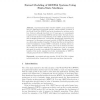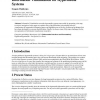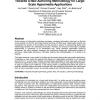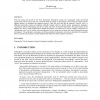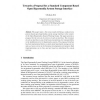127
click to vote
ICWE
2011
Springer
14 years 5 months ago
2011
Springer
Representational State Transfer (REST), as an architectural style for distributed hypermedia systems, enables scalable operation of the World Wide Web (WWW) and is the foundation f...
109
click to vote
NRHM
2002
15 years 1 months ago
2002
In this article we claim that the linguistic-centred view within hypermedia systems needs refinement through a semiotic-based approach before real interoperation between media can...
CSUR
1999
15 years 1 months ago
1999
: Information Visualization can make hypermedia systems more usable by presenting a site map to assist in navigation. In this paper we explain some of the difficulties in developin...
103
click to vote
RCC
2000
15 years 1 months ago
2000
Large-scale distributed hypermedia systems comprise a generation of powerful tools to meet the demands of the new information globalization era. The most promising of such systems...
118
click to vote
MTA
2000
15 years 1 months ago
2000
As the amount of information technology increases, managing information resources, so that the correct people can find the information easily, becomes a critical issue. Hypermedia...
123
click to vote
IADIS
2003
15 years 3 months ago
2003
Hypermedia systems (whether web sites or not) should support multilevel policiesm, offering different views and manipulation abilities of the same information to users with differ...
IADIS
2003
15 years 3 months ago
2003
With the advent and growth of the Web, hypermedia information systems have propagated within and beyond organizations. Much concern has been expressed about the quality of hyperme...
115
click to vote
OHS
2000
Springer
15 years 5 months ago
2000
Springer
Abstract. This paper takes a first step towards defining a standard component-based open hypermedia system storage interface in the context of the Open Hypermedia System Working Gr...
101
click to vote
MHVR
1994
15 years 6 months ago
1994
This paper examines the incorporation of three-dimensional models into hypermedia systems as fully- edged documents. Their use provides hypermedia authors with an additional, powe...
100
click to vote
IFIP
1994
Springer
15 years 6 months ago
1994
Springer
There have been innumerable glowing reports of the way hypermedia systems allow users to explore and use vast amounts of information in ways not possible using traditional informa...
